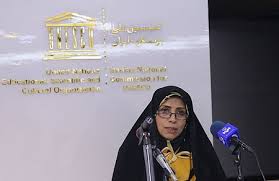
The joyous event consisted of a series of speeches on the role of women in different aspects of life, as well as cultural performances.
In his opening remarks Dr. Mansourzade, Head of Sa’adabad Historical and Cultural Complex, talked about the important role of women throughout history and underlined that the advancement of women was crucial for the advancement of society as a whole.
Ms. Kuisch Laroche, UNESCO Representative in Iran, talked about the role of women in sustainable development. "In order to be meaningful and sustainable, development must be equitable and inclusive. Sustainability cannot be achieved when half of humanity is held back. This is why UNESCO and the United Nations at large have a specific focus on the empowerment of girls and women”, she said.
Ms. Kuisch Laroche stressed the importance of education in that regard. "Education is a foundation for nurturing understanding of our shared humanity and a sense of shared responsibility for the future. And this is very important, because sustainability requires changes in how we behave, produce and consume.
Fundamentally, it requires new ways of seeing the world, new ways of thinking about our responsibilities to each other and the planet, new ways of acting and behaving as global citizens.
Women empowered through education can be leading actors in this process, as they often form part of strong social networks within their communities and can play a vital role in the collective management of change.”
The UN Resident Coordinator spoke about the UN’s global efforts in the empowerment of women and talked about the 20th anniversary of the Beijing Declaration and Platform for Action in 1995.
"Since that historic gathering in Beijing there has been increasing recognition that gender equality is not only women’s universal right and entitlement, but it is also a precondition for global development, justice and peace”, said Mr. Lewis.
The keynote speaker of the event was Dr. Masoumeh Ebtekar, Vice President of the Islamic Republic of Iran and Head of the Department of Environment. Dr. Ebtekar spoke of the important role model that Bibi Fatima Zahra, the daughter of the Prophet Mohammed, had set for future generations of women around the world, through her famous sermon at the Nabawi Mosque. She also talked about women and the environment, and mentioned that the Department of Environment had recently signed a MoU with the Vice-President for Women and Family Affairs to further strengthen the role of women as protectors of the environment.
Several female representatives of NGOs and the private sector then spoke of the role of women in science, entrepreneurship, and policy-making.
Dr. Saeidabadi, Secretary-General of the Iranian National Commission for UNESCO talked about women and sports, and the importance of increased representation of women in decision-making and leadership roles within sport.
In the closing remarks, Dr. Talebian, Deputy Head of Iran’s Cultural Heritage, Handicrafts and Tourism Organization (ICHHTO) spoke about women and cultural heritage, and emphasized the leading role that women play in producing and transmitting intangible cultural heritage.
After the ceremony, the guests visited three art exhibitions by Iranian women artists in the Fine Art Museum, Miremad Museum and Sa’adabad Art Gallery.

Add new comment